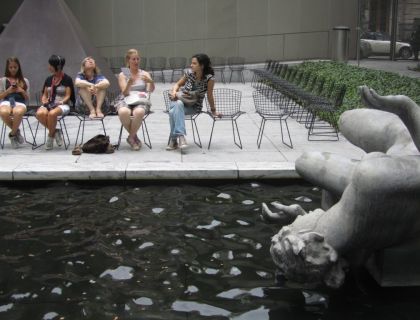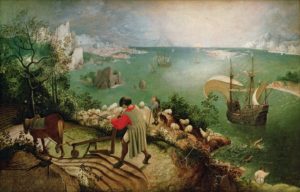Falling Man

.
This is the picture I took several years ago in MOMA’s courtyard. Five women chatting, oblivious to the monstrous event right in front of their eyes.
A friend recently commented on my photograph: that it reminds him of Auden’s poem “Museé des Beaux Arts,” an ekphrastic treatment of Breughel’s ‘Icarus.’ All three, Auden’s poem, Breughel’s painting, and my photograph deal with the same theme: of human suffering being ignored.
Museé des Beaux Arts — W. H. Auden
About suffering they were never wrong,
The old Masters: how well they understood
Its human position: how it takes place
While someone else is eating or opening a window or just walking dully along;
How, when the aged are reverently, passionately waiting
For the miraculous birth, there always must be
Children who did not specially want it to happen, skating
On a pond at the edge of the wood:
They never forgot
That even the dreadful martyrdom must run its course
Anyhow in a corner, some untidy spot
Where the dogs go on with their doggy life and the torturer’s horse
Scratches its innocent behind on a tree.
In Breughel’s Icarus, for instance: how everything turns away
Quite leisurely from the disaster; the ploughman may
Have heard the splash, the forsaken cry,
But for him it was not an important failure; the sun shone
As it had to on the white legs disappearing into the green
Water, and the expensive delicate ship that must have seen
Something amazing, a boy falling out of the sky,
Had somewhere to get to and sailed calmly on.
.

XIR3675 Landscape with the Fall of Icarus, c.1555 (oil on canvas) by Bruegel, Pieter the Elder (c.1525-69); 73.5×112 cm; Musees Royaux des Beaux-Arts de Belgique, Brussels, Belgium; (add.info.: Icarus seen with his legs thrashing in the sea;); Giraudon; Flemish, out of copyright
.
Thoughts inspired by this:
- I often feel guilty now enjoying myself with trivial matters, laughing at a joke, watching a film on TV, attending my garden: because right now, as I’m doing these things, with my full knowledge, utter destruction and mayhem is happening in Europe, of an intensity approaching WWII.
- It is true that the women in the photograph are confronted with a work of art, not with an instance of human suffering. The timeless depiction in stone makes it easy for the observers to postpone, or entirely ignore, the confrontation with pain in others.
- I suppose it lies in the nature of a museum that in the exhibition halls the work of art and the underlying agenda of the artist meet with the profane: with people whose minds are scattered, full of trivialities and the distractions of the day.
- One of my uncles, a visual artist himself, had a very strict notion of etiquette during art consumption. To speak during a radio broadcast of a classical symphony in his living room was nothing less than blasphemy.
This entry was posted in Blog and tagged Breughel, Icarus, martyrdom, painting, ploughman, W.H. Auden, water. Bookmark the permalink.

Leave a Reply